
BULLETIN OF THE GEOLOGICAL SOCIETY OF DENMARK
Scope & Guideline
Unveiling the Layers of Earth's Secrets
Introduction
Aims and Scopes
- Geological History and Stratigraphy:
A core focus of the journal is the detailed study of geological formations and their stratigraphic relationships, emphasizing the geological history of Denmark and adjacent areas. This includes research on sedimentary sequences, tectonic events, and the evolution of the landscape. - Paleontology and Fossil Records:
The journal publishes significant findings related to paleontology, including descriptions of new fossil species and insights into ancient ecosystems. This area underscores the importance of fossil records in understanding past biological diversity and environmental conditions. - Neotectonics and Geodynamics:
Research on neotectonic processes and their implications for the geological landscape is a prominent theme. This includes studies on postglacial deformations and the tectonic evolution of basins, contributing to the understanding of current geological dynamics. - Sedimentology and Depositional Processes:
The journal emphasizes sedimentological studies, exploring depositional environments and processes, particularly in relation to various geological timeframes within the Danish context. This includes investigations into carbonate and clastic sedimentation. - Environmental Geology and Quaternary Studies:
The journal covers research related to environmental geology, including studies on the impact of glaciation and Holocene developments. This area is crucial for understanding contemporary geological processes and their implications for the environment.
Trending and Emerging
- Neotectonics and Postglacial Studies:
Recent publications have increasingly focused on neotectonic processes and their implications for understanding postglacial landscapes, indicating a rising interest in how recent geological events shape current geological features. - Marine Paleontology and Fossil Assemblages:
There is a growing trend towards studying marine paleontology, particularly with the documentation of new fossil species from marine sediments, highlighting the importance of marine environments in understanding biodiversity and ecological changes. - Integration of Technology in Geological Studies:
The use of advanced technologies, such as convolutional neural networks for mapping geological features, signifies an emerging trend towards integrating computational methods into geological research, enhancing the precision and efficiency of geological analyses. - Holocene Environmental Changes:
Research on Holocene developments, particularly in relation to human impact and environmental changes, has gained traction, indicating a shift towards understanding recent geological and environmental dynamics.
Declining or Waning
- Paleoclimatology Studies:
Research specifically focused on paleoclimatology appears to be decreasing, potentially due to a shift towards more localized geological studies and contemporary environmental issues rather than broader climatic reconstructions. - Trace Fossils and Ichnology:
Although still a relevant topic, there has been a noticeable reduction in the number of publications concerning trace fossils and ichnological studies. This may indicate a waning interest or a consolidation of research efforts into more specific or novel areas of paleontological study. - Volcanology and Igneous Petrology:
Research related to volcanology and igneous processes has become less frequent, possibly reflecting a broader focus on sedimentary and stratigraphic studies within the journal's recent publications.
Similar Journals
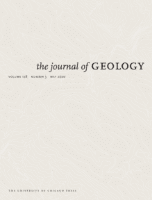
JOURNAL OF GEOLOGY
Bridging Theory and Practice in Geosciences.The JOURNAL OF GEOLOGY, published by University of Chicago Press, serves as a premier platform for disseminating groundbreaking research in the field of geology. Established in 1973, this esteemed journal has consistently ranked in the Q2 category in geology, further solidified by its Scopus ranking, where it is positioned at 99 out of 321 in Earth and Planetary Sciences, marking it in the 69th percentile of its category. With an emphasis on innovative and interdisciplinary studies, the journal features peer-reviewed articles that contribute to the understanding of geological processes, earth materials, and environmental interactions. Although it does not currently offer open access, it facilitates broad access through academic institutions to reach a global audience of researchers, professionals, and students striving to advance the knowledge of Earth's history and dynamics. As a vital resource for the geology community, the JOURNAL OF GEOLOGY plays an essential role in fostering scholarly dialogue and advancing both academic inquiry and practical applications in geology.
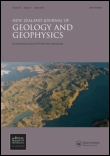
NEW ZEALAND JOURNAL OF GEOLOGY AND GEOPHYSICS
Exploring Earth's Mysteries, One Insight at a Time.NEW ZEALAND JOURNAL OF GEOLOGY AND GEOPHYSICS, published by Taylor & Francis Ltd, stands as a prominent forum dedicated to the interdisciplinary exploration of geological and geophysical phenomena. With an impact factor that situates this journal in the prestigious Q1 category across key subjects—namely Earth and Planetary Sciences, Geology, and Geophysics—it is a critical resource for researchers, professionals, and students alike. The journal has been operational since 1958 and continues to contribute valuable insights into the complexities of the Earth's processes. Although it does not currently offer Open Access options, its broad readership benefits from an extensive archive of high-quality research findings that span from 1958 to 2024. Located in the United Kingdom, the journal remains a pivotal player in advancing the understanding of Earth's systems, making significant contributions to both academic inquiry and practical applications in the field.
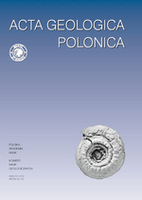
ACTA GEOLOGICA POLONICA
Unveiling Earth's secrets through rigorous scientific inquiry.ACTA GEOLOGICA POLONICA is a distinguished journal published by the Polska Akademia Nauk, in collaboration with the University of Warsaw's Geology Department. Since its inception, it has served as a vital platform for disseminating innovative research in the field of Geology, reflecting a commitment to advancing scientific knowledge in Earth and planetary sciences. With an ISSN of 0001-5709 and an E-ISSN of 2300-1887, this journal provides a rigorous review process and is classified in the Q3 quartile for Geology as of 2023, indicating its growing influence in the discipline. Despite not being open access, the journal facilitates meaningful contributions that span a range of geological topics from fundamental research to applied sciences, thereby enriching the academic landscape. Researchers, professionals, and students alike are encouraged to engage with the valuable findings and discussions contained within its pages, which continue to shape the future of geological inquiry.

FACIES
Unveiling Earth's Secrets: Where Research Meets DiscoveryFACIES is a prominent academic journal published by Springer, dedicated to advancing knowledge in the fields of Geology, Paleontology, and Stratigraphy. With its rich history since 1979 and an impactful convergence of research efforts extending through 2024, FACIES has established itself as a vital resource for scholars and practitioners. The journal boasts impressive ranking metrics: it is positioned in Q2 within Geology and Stratigraphy, and Q1 in Paleontology, reflecting its high-quality contributions to the academic community. Furthermore, its notable Scopus ranks—#28 in Paleontology, #16 in Stratigraphy, and #91 in Geology—underscore its influence and relevance. Although not an open-access journal, FACIES continues to provide significant findings that inform geological practices and enrich our understanding of past and present Earth systems. It serves as an essential platform for innovative research, making it invaluable for researchers, professionals, and students who seek to impact the fields of Earth sciences.

BULLETIN OF GEOSCIENCES
Illuminating the Intersections of Geology and EnvironmentBULLETIN OF GEOSCIENCES, published by the prestigious Czech Geological Survey, stands as a pivotal resource in the fields of Earth and Planetary Sciences and Environmental Science. Since its inception in 2003, the journal has been committed to advancing knowledge through high-quality research, currently holding a commendable Q2 ranking in both disciplines. With its focus on diverse and innovative topics, BULLETIN OF GEOSCIENCES provides an essential platform for researchers, professionals, and students aiming to disseminate and access impactful studies. The journal is indexed in Scopus, ranking #78/195 in General Earth and Planetary Sciences and #110/233 in General Environmental Science, reflecting its significant contribution to academia. Publishing from Prague, Czech Republic, this journal invites contributions that illuminate the interactions between geological processes and environmental phenomena, ensuring an inclusive and accessible approach to crucial global issues.
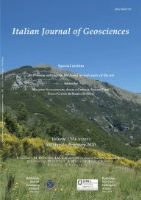
Italian Journal of Geosciences
Empowering Inquiry: Your Source for Geoscientific ExcellenceItalian Journal of Geosciences, published by the Società Geologica Italiana, is a distinguished platform for the dissemination of research in the fields of Earth and Planetary Sciences and Geology. With an impressive impact factor reflected in its 2023 rankings, where it placed in the Q3 category across its related fields, this journal serves as a vital resource for academics, practitioners, and students. Established in 2010 and poised to continue until 2024, the journal showcases critical advancements and interdisciplinary studies that deepen our understanding of geological processes and Earth systems. Operating under open access options, it offers robust accessibility to a broad audience, facilitating wider dissemination of knowledge. The journal's affiliation with Università degli Studi La Sapienza in Rome, Italy, further underscores its commitment to academic excellence and innovation in geosciences.
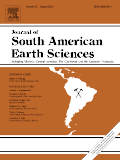
JOURNAL OF SOUTH AMERICAN EARTH SCIENCES
Exploring the Depths of South American GeologyJOURNAL OF SOUTH AMERICAN EARTH SCIENCES is a premier interdisciplinary journal dedicated to publishing high-quality research in the fields of Earth-Surface Processes, Geology, and Paleontology, making it an essential resource for scientists and researchers focused on South American geology and its diverse geological phenomena. Published by Pergamon-Elsevier Science Ltd in the United Kingdom, this journal has been instrumental in disseminating groundbreaking studies since 1988, showcasing contributions that push the boundaries of knowledge in Earth and Planetary Sciences. With an impressive Scopus ranking—positioning it in the 74th percentile for Paleontology and 71st for Geology—this journal not only reflects robust academic quality but also its commitment to addressing critical geological challenges in South America. Researchers will appreciate its objective of advancing understanding of geological processes while providing insights into past, present, and future Earth environments. Although available through traditional subscription models, the journal's vast repository of articles enriches the academic landscape, facilitating the sharing of vital research among professionals, students, and geological practitioners.
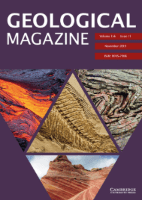
GEOLOGICAL MAGAZINE
A Legacy of Excellence in Geological ScholarshipGEOLOGICAL MAGAZINE, published by Cambridge University Press, is a premier journal in the field of geology, renowned for its rich legacy since 1864 and ongoing contributions to Earth and Planetary Sciences. With an impressive Q1 ranking in Geology and a Scopus rank of #70 out of 321 journals, it holds a significant position within the academic community, appealing to researchers, professionals, and students alike. The journal covers a wide array of topics, ensuring a comprehensive platform for the dissemination of cutting-edge geological research. Although it does not offer open access, it remains a vital resource for those seeking to stay abreast of advancements in the field. With an enduring commitment to quality, GEOLOGICAL MAGAZINE stands as an essential outlet for scholarly communication and serves as a catalyst for academic discourse within the geological sciences.

Geosphere
Leading the Charge in Stratigraphic Research and InnovationGeosphere is a premier open access journal published by the Geological Society of America, Inc., dedicated to advancing the fields of geology and stratigraphy. Since its inception in 2005, this journal has established itself as a critical platform for sharing high-quality research, evidenced by its robust positioning in the 2023 Scopus rankings, where it holds the 12th rank in stratigraphy and 75th in geology. With an impressive impact factor and a commitment to open access since 2018, Geosphere facilitates the dissemination of significant findings to a global audience, making it an essential resource for researchers, professionals, and students alike. The journal's scope includes a wide range of topics related to Earth and Planetary Sciences, encouraging interdisciplinary collaboration and innovation. Based in the United States, Geosphere continues to foster a community dedicated to understanding the Earth's processes and resources, ensuring that it remains at the forefront of geological research.

ANNALES SOCIETATIS GEOLOGORUM POLONIAE
Unveiling Geological Insights from Poland and the World.ANNALES SOCIETATIS GEOLOGORUM POLONIAE is a distinguished journal published by the Polish Geological Society, focusing on pivotal research in the fields of geology, economic geology, and stratigraphy. With an ISSN of 0208-9068, this journal has established itself as an essential platform for disseminating significant findings and advancements in geological sciences since its convergence in 2008. The journal proudly holds a Q2 quartile ranking in the categories of Economic Geology, Geology, and Stratigraphy as of 2023, indicating its respectable position within the global academic community. Researchers will find its indexed status in Scopus, ranking #138/321 in Geology and showcasing a solid presence in key geological sub-disciplines. While the journal is not open access, it remains a vital resource for professionals and students striving for insight into contemporary geological research. Located in Krakow, Poland, the journal continues to contribute significantly to the understanding of geological processes and resources, making it an indispensable reference for anyone in the field.